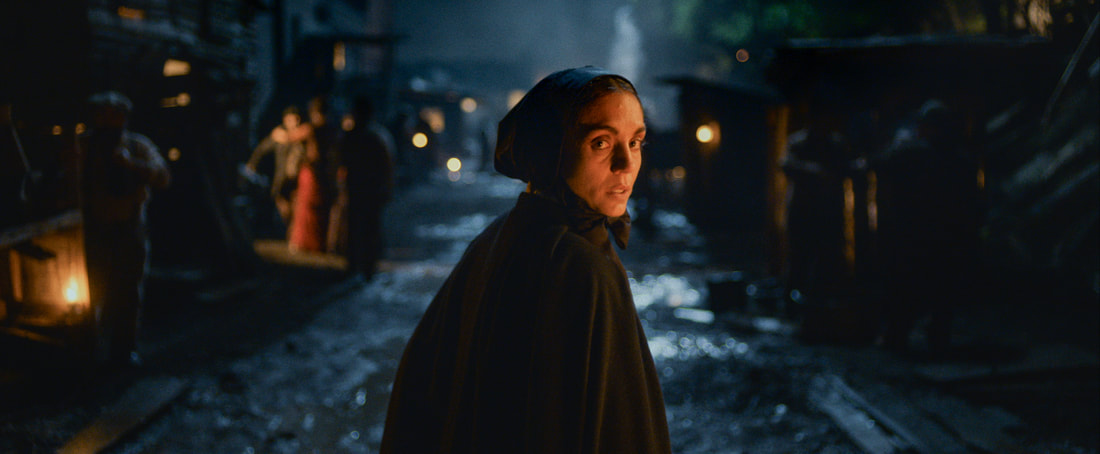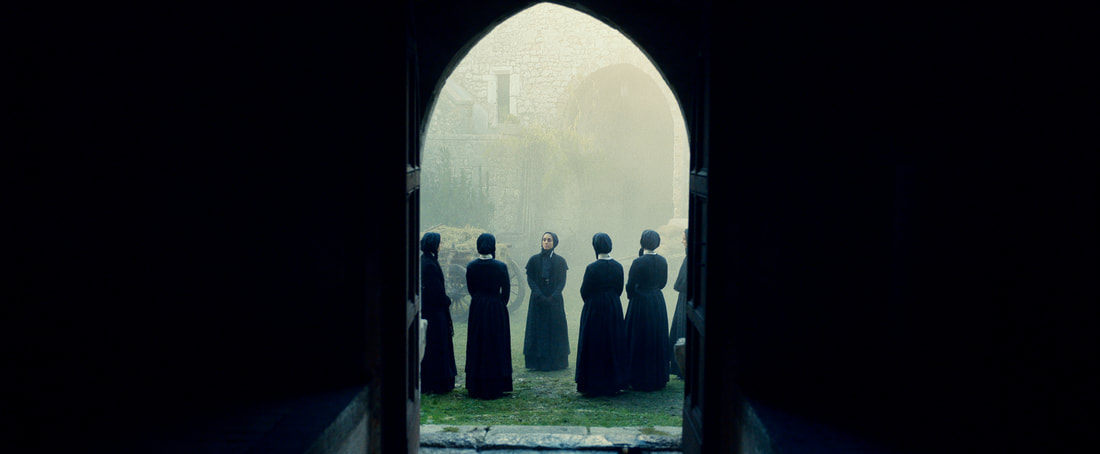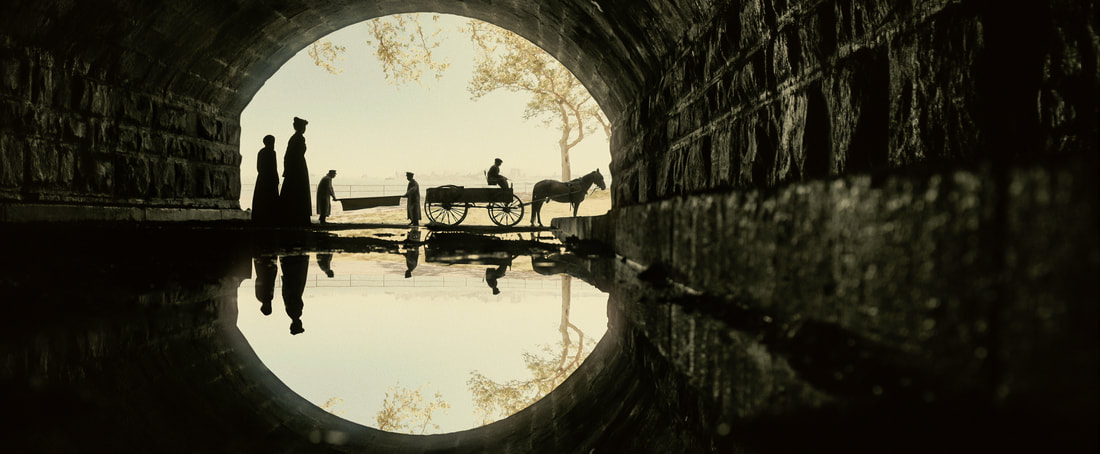|
Review by Daniel Lima The problem with many of the faith-based films of the West is the seemingly universal desire to merely reflect the values of their audience rather than give even the barest hint of any challenge to their deeply held beliefs. Nuance in the portrayal of venerated religious figures, interrogation of the righteousness of Christian dogma, and anything that could possibly be construed as questioning the moral fortitude and objective truth that the New Testament provides is prohibited. Unfortunately, these complexities are the stuff of compelling stories, so a film like Angel Studios' Cabrini is left devoid of anything that is even marginally interesting. Frances Xavier Cabrini was a nun who, at the turn of the 20th century, established a mission in New York City to attend to the needs of Italian immigrants. A passionate advocate for the rights of her fellow countrymen, she was very effective in cultivating and organizing aid and establishing schools, orphanages, and even a hospital. Decades after her death, she became the first U.S. citizen to be canonized by the Roman Catholic Church. Reader, you are now freed from the obligation of seeing Cabrini. That description sums up the experience of watching the movie. As impressive as this woman's accomplishments were, particularly considering the discrimination she would face as both a woman and an Italian immigrant herself, she was undoubtedly more than a series of bullet points detailing important moments in her life. Certainly, she must have had doubts, if not in her Christian faith, then in the institution to which she devoted herself. Perhaps she wavered in her dedication to her cause or in her certainty that she could surmount the obstacles in her way. One could imagine that the transition from pastoral Italy to an industrial-age urban slum might have presented a significant readjustment to her daily life or worldview. So many possible avenues exist to explore who she was as a flesh-and-blood person rather than a historical figure or saintly object. This film is uninterested in any of that. Here, she is an uncompromising, static individual, a paragon whose perspective is always both morally superior and entirely practical. She faced no adversity that a well-placed admonishment or impassioned plea could not brush aside; if one scene sees an authority figure set up a roadblock, rest assured it will be dismantled in the next. Doggedly uncomplicated, lacking any inner turmoil, practicing exactly what she preached, she was in life exactly what she is in death: an idol. To be fair, this form of superficial hagiography is a common sight in secular productions, with many such films earning critical and commercial success despite their own dull, bland retread of personal histories. Indeed, Cabrini does not spend much time on its protagonist's Christian faith at all; instead, she focuses on her efforts on behalf of the Italian Americans consigned to the bottom rungs of NYC society. This is more similar to a stodgy, liberal-minded biopic than the proselytizing drivel that makes up most faith-based productions. If anything, that is to the film's detriment. The lack of a meaningful exploration of her religious convictions — a crucial part of who she was — is a glaring omission that calls even more attention to how shallow this depiction of her life and work actually is. That such an exploration does not necessitate a critique of Christianity, or even the Roman Catholic Church, is obviously irrelevant. Anything less than a fawning, perfect portrait of the saint could be deemed an offense to the target audience, so that dramatically rich path is closed off. That's not to say that Cabrini lacks ideology or social messaging. The cursory, surface-level overview of her biography is itself a statement, preserving the events of the film in amber and stymieing any attempt to draw parallels between early 20th-century America and the present day. Specifically, the dire circumstances of Italian Americans at the time could easily be compared to how the West treats immigrants, refugees, and other marginalized groups today. While the closing narration limply gestures towards such a comparison, their plight is otherwise viewed purely through the lens of recounting Cabrini's accomplishments, rooting their struggles in the sociopolitical realities unique to that era. Considering director Alejandro Monteverde is himself a naturalized American citizen, this pointed refusal for a more explicit link to the present is surprising. Considering his previous film for Angel Studios was the Sound of Freedom, which utilized universal revulsion towards sex trafficking and genre conventions as a smokescreen for fringe right-wing politics, this makes sense. In the world of Cabrini, sandblasted of any complexity or nuance or any resembling a critical eye, venerable institutions that actively participate in the subjugation of human beings are not intrinsically rotten, merely slow-moving, in need of shaking up by a passionate individual who is nevertheless a fervent adherent to the established social order. Reform is preferable to revolution, and even then, in its own due time. It's a decidedly conservative vision, made palatable to a mass audience by avoiding overt preaching. That this is the fictional take on a life that seems far more textured in reality is insulting.
Credit where it's due; this is a handsome movie. Though it takes on the same sickly and desaturated hue as other period works, there are some inspired compositions here, often framing Cabrini within geometric shapes that naturally draw the eye towards her diminutive figure. Adding to this effect are the dramatic lighting, detailed costumes, and production design. These are not in service to much, but at least it shows that Monteverde has an eye for these visual details. Hopefully, he one day finds a better showcase for his abilities than the likes of this. Ultimately, Cabrini is a bloodless, banal biopic of a woman who deserved a more intellectually curious and challenging film. Though there is a politically conservative undercurrent, more damning is its artistic conservatism, relegating it to nothing more than a dry rehashing of an eventful life. For those still curious, Frances Xavier Cabrini's Wikipedia article is every bit as insightful and dramatically fulfilling, and that can be read in only a couple of minutes. Cabrini arrives in theaters March 8. Rating: 2/5
0 Comments
Leave a Reply. |
Archives
July 2024
Authors
All
|
|
|
disappointment media
Dedicated to unique and diverse perspectives on cinema! |



